Team:ENSPS-Strasbourg/Team
From 2011.igem.org
| Line 21: | Line 21: | ||
'''Pr. Jacques Haeich'''<br> | '''Pr. Jacques Haeich'''<br> | ||
| - | [[File:J_Haeich|frameless|border | + | [[File:J_Haeich.jpg|frameless|border]] |
Jacques Haiech got a M.D. degree in Mathematics and computer science in 1975 and then a M.D. and a PhD degree in Biochemistry in 1978 dealing with cell signaling (focusing on calcium signal in muscle cells). After his PhD, he has been working part time successively at NCI in Bethesda, then at Vanderbilt University and finally at Northwestern University (Chicago) while being research director at “Centre National de la Recherche Scientifique” in France, studiyng cellular calcium signals before joining the Strasbourg University as a full professor in 1997. He has founded the first synthetic biology option in an engineering school in France in 2008 along with the first participation of the ESBS-Team to the iGEM competition. Since then, he has developed collaboration with the Strasbourg engineering school of physics on “Design Methodology and Modeling of Synthetic Biosystems”. He is now working in integrating concepts of synthetic biology in personalized medicine. | Jacques Haiech got a M.D. degree in Mathematics and computer science in 1975 and then a M.D. and a PhD degree in Biochemistry in 1978 dealing with cell signaling (focusing on calcium signal in muscle cells). After his PhD, he has been working part time successively at NCI in Bethesda, then at Vanderbilt University and finally at Northwestern University (Chicago) while being research director at “Centre National de la Recherche Scientifique” in France, studiyng cellular calcium signals before joining the Strasbourg University as a full professor in 1997. He has founded the first synthetic biology option in an engineering school in France in 2008 along with the first participation of the ESBS-Team to the iGEM competition. Since then, he has developed collaboration with the Strasbourg engineering school of physics on “Design Methodology and Modeling of Synthetic Biosystems”. He is now working in integrating concepts of synthetic biology in personalized medicine. | ||
Revision as of 08:43, 20 September 2011
Contents |
TEAM
Undergraduates:
Martin Andraud
 Martin Andraud started studying electronics for his Baccalauréat in 2006. After a technician diploma in electronic systems in 2008, he did a preparatory course so as to integrate ENSPS in 2009. Here, after choosing the microelectronics course, he is now interested in applying electronics to live sciences (medicine, biotechnologies). This project is so a way for him to put his knowledge in electronics into an emerging research field, synthetic biology, and apply it to a new approach of merging those two sciences.
Martin Andraud started studying electronics for his Baccalauréat in 2006. After a technician diploma in electronic systems in 2008, he did a preparatory course so as to integrate ENSPS in 2009. Here, after choosing the microelectronics course, he is now interested in applying electronics to live sciences (medicine, biotechnologies). This project is so a way for him to put his knowledge in electronics into an emerging research field, synthetic biology, and apply it to a new approach of merging those two sciences.
Vincent Wlotzko
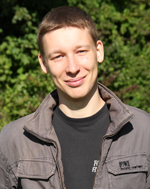 Vincent Wlotzko has studied mathematics and physics, for his baccalauréat in 2007, and his two years preparatory course so as to enter at ENSPS in 2009. For the continuation of his course, he has chosen a specialization in micro and nano electronics, and the “bio-systems” module is a way for him to extend his electronics skills to a living science field, to develop a new idea of applying microelectronics to synthetic biology, and also give new possibilities, between those two fields.
Vincent Wlotzko has studied mathematics and physics, for his baccalauréat in 2007, and his two years preparatory course so as to enter at ENSPS in 2009. For the continuation of his course, he has chosen a specialization in micro and nano electronics, and the “bio-systems” module is a way for him to extend his electronics skills to a living science field, to develop a new idea of applying microelectronics to synthetic biology, and also give new possibilities, between those two fields.
Advisors:
Pr. Jacques Haeich
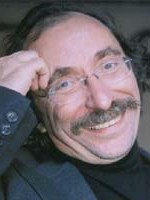 Jacques Haiech got a M.D. degree in Mathematics and computer science in 1975 and then a M.D. and a PhD degree in Biochemistry in 1978 dealing with cell signaling (focusing on calcium signal in muscle cells). After his PhD, he has been working part time successively at NCI in Bethesda, then at Vanderbilt University and finally at Northwestern University (Chicago) while being research director at “Centre National de la Recherche Scientifique” in France, studiyng cellular calcium signals before joining the Strasbourg University as a full professor in 1997. He has founded the first synthetic biology option in an engineering school in France in 2008 along with the first participation of the ESBS-Team to the iGEM competition. Since then, he has developed collaboration with the Strasbourg engineering school of physics on “Design Methodology and Modeling of Synthetic Biosystems”. He is now working in integrating concepts of synthetic biology in personalized medicine.
Jacques Haiech got a M.D. degree in Mathematics and computer science in 1975 and then a M.D. and a PhD degree in Biochemistry in 1978 dealing with cell signaling (focusing on calcium signal in muscle cells). After his PhD, he has been working part time successively at NCI in Bethesda, then at Vanderbilt University and finally at Northwestern University (Chicago) while being research director at “Centre National de la Recherche Scientifique” in France, studiyng cellular calcium signals before joining the Strasbourg University as a full professor in 1997. He has founded the first synthetic biology option in an engineering school in France in 2008 along with the first participation of the ESBS-Team to the iGEM competition. Since then, he has developed collaboration with the Strasbourg engineering school of physics on “Design Methodology and Modeling of Synthetic Biosystems”. He is now working in integrating concepts of synthetic biology in personalized medicine.
Instructors
Yves Gendrault
 After obtaining his bachelor's degree in Electronique, Signaux et Automatique (ESA), Yves does a Master’s degree in Micro-and Nano-Electronique (MNE) at the Université de Strasbourg (UdS). He discovers the field of Synthetic Biology during an internship in the Institut d'Electronique du Solide et des Systèmes (InESS) laboratory in Strasbourg. During this internship he creates models for several biological processes. Because Synthetic Biology is situated between engineer sciences and biotechnologies, the collaboration with biotechnologists is for him fundamental for a better understanding. In this way, he has started his Ph.D program, untitled “standardization of the design flow for synthetic biology”.
Yves has already participated to iGEM competition, with the ESBS team in 2010.
After obtaining his bachelor's degree in Electronique, Signaux et Automatique (ESA), Yves does a Master’s degree in Micro-and Nano-Electronique (MNE) at the Université de Strasbourg (UdS). He discovers the field of Synthetic Biology during an internship in the Institut d'Electronique du Solide et des Systèmes (InESS) laboratory in Strasbourg. During this internship he creates models for several biological processes. Because Synthetic Biology is situated between engineer sciences and biotechnologies, the collaboration with biotechnologists is for him fundamental for a better understanding. In this way, he has started his Ph.D program, untitled “standardization of the design flow for synthetic biology”.
Yves has already participated to iGEM competition, with the ESBS team in 2010.
Pr. Christophe LALLEMENT
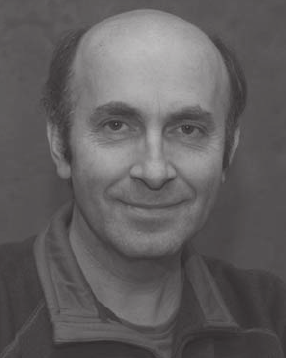 Christophe Lallement received the M.S. degree in engineering from the Science University of Nancy I, Nancy, France, and the Ph.D. degree in engineering from the École Nationale Supérieure des Télecommunications, Paris, France. From November 1994 to September 1997, he was a Postdoctoral Research Scientist with the Laboratory of Electronics, Swiss Federal Institute of Technology in Lausanne (EPFL), Lausanne, Switzerland, working on the characterization and modeling of the metal-oxide-semiconductor field effect transistor (MOSFET) in the development team of the Enz-Krummenacher-Vittoz MOSFET model. In September 1997, he was an Associate Professor with the Université de Strasbourg (UdS), Strasbourg, France, and the Laboratory for Physics and Applications of Semiconductors, Centre National de la Recherche Scientifique. Since September 2003, he has been a Professor with the École Nationale Supérieure de Physique de Strasbourg, Illkirch, France. He is currently with the Institut d’Électronique du Solide et des Systèmes (InESS), UdS, working on the study and the modeling of advanced devices, very-high-speed integrated-circuit hardware description language analog and mixed-signal systems, and biosynthetic systems. He is the responsible for the group “Integrated Instrumental Systems” at InESS.
Christophe Lallement received the M.S. degree in engineering from the Science University of Nancy I, Nancy, France, and the Ph.D. degree in engineering from the École Nationale Supérieure des Télecommunications, Paris, France. From November 1994 to September 1997, he was a Postdoctoral Research Scientist with the Laboratory of Electronics, Swiss Federal Institute of Technology in Lausanne (EPFL), Lausanne, Switzerland, working on the characterization and modeling of the metal-oxide-semiconductor field effect transistor (MOSFET) in the development team of the Enz-Krummenacher-Vittoz MOSFET model. In September 1997, he was an Associate Professor with the Université de Strasbourg (UdS), Strasbourg, France, and the Laboratory for Physics and Applications of Semiconductors, Centre National de la Recherche Scientifique. Since September 2003, he has been a Professor with the École Nationale Supérieure de Physique de Strasbourg, Illkirch, France. He is currently with the Institut d’Électronique du Solide et des Systèmes (InESS), UdS, working on the study and the modeling of advanced devices, very-high-speed integrated-circuit hardware description language analog and mixed-signal systems, and biosynthetic systems. He is the responsible for the group “Integrated Instrumental Systems” at InESS.
Dr Morgan MADEC
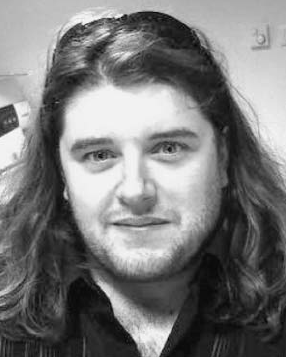 Morgan Madec was born in 1980. He received the M.S. and Ph.D. degrees in microelectronics from the University Louis Pasteur (ULP), Strasbourg, France, in 2003 and 2006 respectively. From 2003 to 2006, he was with the Laboratoire de Physique et Application des Semi-Conducteurs (PHASE), ULP Centre National de Recherches Scientifiques, Strasbourg, where he prepared a Ph.D. thesis on the design, the simulation and the characterization of optical processors in order to speed up image reconstruction in the medical field.
He is currently a Professor Associate with the Institut d’Électronique du Solide et des Systèmes, Université de Strasbourg, Strasbourg and teaches electronics in the Ecole Nationale Supérieure de Physique de Strasbourg, University of Strasbourg.
His research interests include compact modeling of integrated microsensors (Hall-effect sensor, photodiode ...). Since 2008, he collaborates with a team of the Laboratoire d’Innovation Therapeutique. The aim of this work is to put the experience in microelectronics system design to good use in synthetic biology.
Morgan Madec was born in 1980. He received the M.S. and Ph.D. degrees in microelectronics from the University Louis Pasteur (ULP), Strasbourg, France, in 2003 and 2006 respectively. From 2003 to 2006, he was with the Laboratoire de Physique et Application des Semi-Conducteurs (PHASE), ULP Centre National de Recherches Scientifiques, Strasbourg, where he prepared a Ph.D. thesis on the design, the simulation and the characterization of optical processors in order to speed up image reconstruction in the medical field.
He is currently a Professor Associate with the Institut d’Électronique du Solide et des Systèmes, Université de Strasbourg, Strasbourg and teaches electronics in the Ecole Nationale Supérieure de Physique de Strasbourg, University of Strasbourg.
His research interests include compact modeling of integrated microsensors (Hall-effect sensor, photodiode ...). Since 2008, he collaborates with a team of the Laboratoire d’Innovation Therapeutique. The aim of this work is to put the experience in microelectronics system design to good use in synthetic biology.
ENSPS
File:ENSPS Logo.jpg
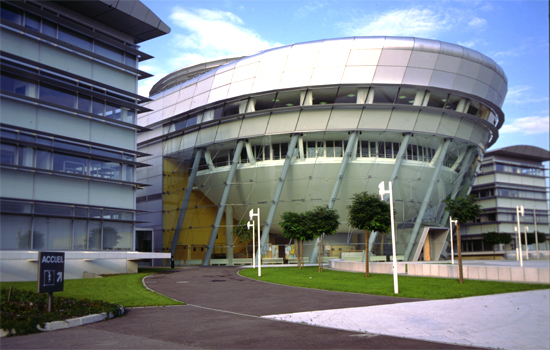 The ENSPS (Ecole Nationale Supérieure de Physique de Strasbourg) is a French graduate engineering school. It is a part of the internationally recognized Strasbourg University (UDS). The school is located in the golden triangle of European research bounded by Alsace, Baden-Wurtemberg and Switzerland in which can be found a major part of the scientific potential of Europe. Rich in high-tech industries, this border region has developed its own international technological-exchanges. Since its foundation in 1970, research training has been a strong tradition at ENSPS through its
partnerships with a number of UDS and CNRS (Centre National de la Recherche Scientifique) research laboratories.
Among the different courses offered by the school, a micro and nano electronics specialization is possible during the last year of the engineering degree. As the school is also turn towards live sciences, optional modules of this course enables students to see microelectronics applied to live sciences. One of the optional modules of this course is called “synthetic biology”, and is aimed at making links between the emerging synthetic biology field and microelectronics. In this way, basic biology knowledge is provided to the students, and a project is settled so as to familiarize students with synthetic biology. The last part of this course is dedicated to make a project, and participate to the iGEM competition.
The ENSPS (Ecole Nationale Supérieure de Physique de Strasbourg) is a French graduate engineering school. It is a part of the internationally recognized Strasbourg University (UDS). The school is located in the golden triangle of European research bounded by Alsace, Baden-Wurtemberg and Switzerland in which can be found a major part of the scientific potential of Europe. Rich in high-tech industries, this border region has developed its own international technological-exchanges. Since its foundation in 1970, research training has been a strong tradition at ENSPS through its
partnerships with a number of UDS and CNRS (Centre National de la Recherche Scientifique) research laboratories.
Among the different courses offered by the school, a micro and nano electronics specialization is possible during the last year of the engineering degree. As the school is also turn towards live sciences, optional modules of this course enables students to see microelectronics applied to live sciences. One of the optional modules of this course is called “synthetic biology”, and is aimed at making links between the emerging synthetic biology field and microelectronics. In this way, basic biology knowledge is provided to the students, and a project is settled so as to familiarize students with synthetic biology. The last part of this course is dedicated to make a project, and participate to the iGEM competition.
Strasbourg University
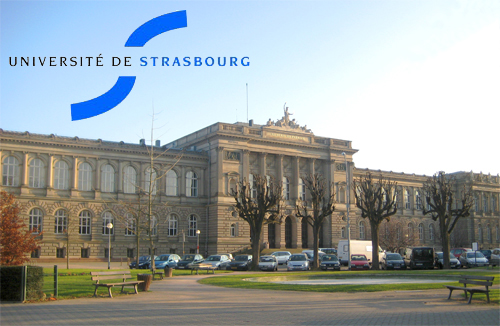 European by nature and international by design, the University's strengths and assets stem from its active involvement in virtually every discipline comprising the current body of knowledge. As a young university founded on an age-old tradition, it strives to attain cross-disciplinarily so that this mixing fosters new research opportunities and produces courses that meet society's need. The international dimension is fundamental for the University of Strasbourg and thanks to the worldwide reputation of its research teams, built on excellence and efficiency; it emerges among Europe's foremost research universities. Each of the University's main academic fields of instruction is based upon research sections that are the driving force of the institution, with over 2,600 professors and 2,000 staff. The Technology Transfer Office, one of the very first developed in a French university, strives to promote the work of the researchers and facilitate partnerships with economic and institutional stakeholders. An essential player in the promotion of scientific and technical culture, the University interfaces with its host city, Strasbourg. Solidly anchored in the European Higher Education Area, the University of Strasbourg, a beating heart of the Alsatian metropolis with its 41,000 students, has the potential to face the challenging international competition.
European by nature and international by design, the University's strengths and assets stem from its active involvement in virtually every discipline comprising the current body of knowledge. As a young university founded on an age-old tradition, it strives to attain cross-disciplinarily so that this mixing fosters new research opportunities and produces courses that meet society's need. The international dimension is fundamental for the University of Strasbourg and thanks to the worldwide reputation of its research teams, built on excellence and efficiency; it emerges among Europe's foremost research universities. Each of the University's main academic fields of instruction is based upon research sections that are the driving force of the institution, with over 2,600 professors and 2,000 staff. The Technology Transfer Office, one of the very first developed in a French university, strives to promote the work of the researchers and facilitate partnerships with economic and institutional stakeholders. An essential player in the promotion of scientific and technical culture, the University interfaces with its host city, Strasbourg. Solidly anchored in the European Higher Education Area, the University of Strasbourg, a beating heart of the Alsatian metropolis with its 41,000 students, has the potential to face the challenging international competition.
 "
"